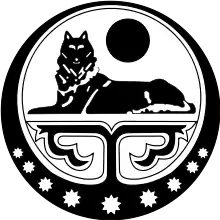Caucasian Front (militant group)
The Caucasian Front (Russian: Кавказский фронт) also called Caucasus Front or the Caucasian Mujahadeen, was formally established in May 2005 as an Islamic structural unit of the Chechen Republic of Ichkeria's armed forces by the decree of the separatist President of Chechnya Abdul-Halim Sadulayev during the Second Chechen War.
| Caucasian Front (Russian: Кавказский фронт) | |
|---|---|
  Flag of Caucasian Front and coat of arms of ChRI | |
| Leaders | • Abdul-Halim Sadulayev †
• Akhmed Yevloyev # • Abdullah Yandurkaev (Emir Abu Muslim) † |
| Dates of operation | May 2005 – 7 October 2007 |
| Headquarters | North Caucasus |
| Active regions | Russia |
| Ideology | Islamic extremism |
| Part of | |
| Opponents | |
| Battles and wars |
|
History
The organisation united various rebel Jamaat groups across the North Caucasus, including the Ingush Jamaat, Shariat Jamaat, Yarmuk Jamaat and Kataib al-Khoul, to fight the Russian rule not only in Chechnya but also in the rest of the Russian Caucasus. It was led by a Chechen commander Shamil Basayev until his death in July 2006 and since then by an ethnic Ingush Akhmed Yevloyev. Yevloyev was captured alive in June 2010. In October 2007 the Caucasian Front was subsumed into the Caucasus Emirate, a self declared Islamic State that claims the North Caucasus of Russia.
While the anti-Russian local insurgencies in North Caucasus started even before the formal creation of the Caucasian Front, two months after Aslan Maskhadov's death, the new Chechen separatist leader Abdul-Halim Sadulayev officially announced that they had formed a Caucasus Front within the framework of "reforming the system of military-political power." Along with the existing Chechen, Dagestani and Ingush "sectors", the Stavropol, Kabardin-Balkar, Krasnodar, Karachai-Circassian, Ossetian and Adyghe jamaats were included in it, meaning that in theory most of the regions of south-west Russia would be involved in hostilities. In October 2006, Dokku Umarov established two new fronts beyond the North Caucasus region – the Volga and the Ural fronts.[1] The Chechen separatist movement had taken on a new role as the official ideological, logistical and, probably, financial hub of the new insurgency in the North Caucasus. Increasingly frequent clashes between federal forces and local rebels continue in Dagestan and Ingushetia, while sporadic fighting erupts in the other southern Russia regions. Before the declaration of the Caucasus Emirate, the movement had conducted two-large scale attacks, the 2004 Nazran raid in Ingushetia (before the formal proclamation) and the 2005 Nalchik raid in Kabardino-Balkaria. The movement also launched many smaller attacks such as the 2006 Avtury ambush & 2007 Zhani-Vedeno ambush.
List of attacks
- 2004 Nazran raid (before the formal proclamation): 87 killed
- 2005 Nalchik raid: 138 killed
- 2006 Avtury ambush: 7 killed
- 2007 Zhani-Vedeno ambush: 5 killed
See also
References
- North Caucasus Conflict Spreads to Tatarstan, The Jamestown Foundation, 2 August 2012